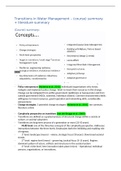Transitions in Water Management – (course) summary
+ literature summary
(Course) summary:
- Policy entrepeneurs (Huitema et al., 2011): individuals/organisations who invest,
instigate and implement policy change. Want to invest their resources in this change.
Change can be instigated from within government (politicians or bureaucrats) and from
outside government (NGOs, scientists, individual citizens). Common characteristics/skills:
willingness to invest resources, good reputation and networking skills, considerable
perseverance
- Change strategies: 5 potential change strategies (Huitema et al., 2011): see summary
literature article
- Complexity perspective on transitions (van der Brugge et al., 2005)::
- Transitions are defined as a gradual process of structural change within a society or
culture, or societal subsystem
- Transitions are long-term process of a generation or more (25-50 years)
- Multi-level: one of the three key concepts of the complexity perspective. Addresses
interactions between the three levels. Emphasizes both the inhibiting and enabling role
of regimes.
- 1st level: landscape (macro) – visions, strategic focus (30 years). Slow broad societal
trends.
- 2nd level: regime level (meso) – governing, tactical focus (5-15 years). Regime:
dominant pattern of actors, artifacts and structures in the societal system
- 3rd level: niche-level, here innovation takes place (micro) – Operational. Individual
persons, organisations, or innovations.
,-
- Multi-phase: transitions are non-linear processes, that involve a shift from one
dynamic equilibrium to another, over four consecutive phases.
- Transition management (Van der Brugge et al., 2005): focuses on governing transitions.
Based on coordinating multi-actor process at different levels, aiming at long-term
sustainability though creation of a joint problem perceptions and long-term vision,
innovation networks and experimental playgrounds. Anticipative and adaptive, as the
degree of complexity of transitions is too high for command-and-control management.
- Transition management cycle (Loorbach, 2010):
- Aim: influencing directions and pace of transition towards more sustainable future
- Long-term thinking and learning-by-doing
- Governance approach based on insights from governance and complex systems theory
as much as upon practical experiment and experience
- Offers a prescriptive approach toward governance
- Normative model by taking sustainable development as long-term goal need for a long-
term perspective to guide short-term development, the acknowledgment of
uncertainties and surprise, the importance of net- works and self-steering, and the
necessity of creating space for innovation.
,- Circle divides the different types of governance activities
- Policy perspective on water transitions: fundamental policy change, also known as
change at the level of overarching goals.
- Transition from this perspective are seen as major policy change. Change at the level of
overarching goals, a new policy path, new policy core believes. Only one part of a
transition. But, an important one.
- The policy entrepreneurs and 5 change strategies are also part of this (Huitema et al.,
2011)
- Agency oriented: focus on important role on individual or collective role of
entrepreneurs. Importance of leadership and policy entrepreneurs
- Distinction between:
- Substantive transitions: involve governments and bargaining on a new course
- Governance transitions: changes in the way in which decisions are reached (e.g.
decentralisation, participatory approaches)
, Resilience (Davoudi, 2012):
- Three understandings of resilience:
- Engineering: single equilibrium
- Ecological: multiple equilibria
- Evolutionary/social-ecological: beyond equilibrium. There is no equilibrium, nature is
constantly evolving.
- Three key dimensions of resilience:
- Resilience implies a diversification of FRM measures and a broadening of responsibilities.
New governance arrangements between state, market and civil society
- Resilience required building up new capacities among public and private stakeholders for
creating and implementing innovative solutions
- Be critical when you hear or use resilience (Davoudi, 2012)
- To what end? Risk of neoliberal policies and government retreat
- What to what? risk of vulnerability transfer (e.g. from one municipality to another)
- For whom? risk of inequality





